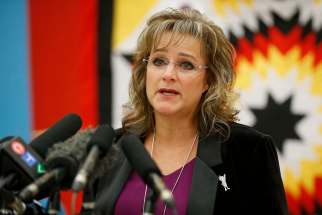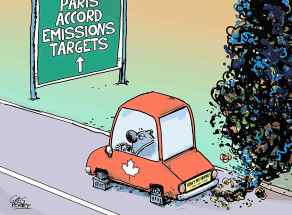Warnings of city cutbacks partly about politics
Read this article for free:
or
Already have an account? Log in here »
To continue reading, please subscribe:
Monthly Digital Subscription
$0 for the first 4 weeks*
- Enjoy unlimited reading on winnipegfreepress.com
- Read the E-Edition, our digital replica newspaper
- Access News Break, our award-winning app
- Play interactive puzzles
*No charge for 4 weeks then price increases to the regular rate of $19.00 plus GST every four weeks. Offer available to new and qualified returning subscribers only. Cancel any time.
Monthly Digital Subscription
$4.75/week*
- Enjoy unlimited reading on winnipegfreepress.com
- Read the E-Edition, our digital replica newspaper
- Access News Break, our award-winning app
- Play interactive puzzles
*Billed as $19 plus GST every four weeks. Cancel any time.
To continue reading, please subscribe:
Add Free Press access to your Brandon Sun subscription for only an additional
$1 for the first 4 weeks*
*Your next subscription payment will increase by $1.00 and you will be charged $16.99 plus GST for four weeks. After four weeks, your payment will increase to $23.99 plus GST every four weeks.
Read unlimited articles for free today:
or
Already have an account? Log in here »
Hey there, time traveller!
This article was published 15/11/2019 (2216 days ago), so information in it may no longer be current.
If the city is bluffing about its fiscal crisis, it’s a good bluff.
Stories of deep cuts in civic services have been flowing from Winnipeg City Hall on an almost daily basis this week: more streetlights turned off during night hours to save utility costs; no more annual flushing of water mains; reductions in Winnipeg Transit bus hours; a cut in the amount of annual riverbank stabilization; elimination of garbage collection for churches, small businesses and small-scale apartment blocks.
According to Mayor Brian Bowman and some council members, cuts are necessary if the city is to stay within the confines of a new multi-year budgeting process that limits property tax increases to just 2.33 per cent annually. The gross majority of those tax increases are going to road renewal and rapid transit. That means hard caps on annual spending increases in other departments.
It should be noted that government budgeting is as much a political exercise as it is about accounting. The release of a proposed budget — which is where we are in the budgeting process — is usually an opportunity for the mayor and council to prepare residents for the worst possible scenario, only to ease back on some of the cuts at the last moment.
If there are to be service cuts or sudden tax increases, citizens are left with a “could’ve been worse” sense that spares elected officials a modicum of backlash.
Is that what’s happening now? It’s hard to tell for sure, but some factors suggest the city’s fiscal situation, even if it’s not as bad as the proposed budget would have us think, is indeed dire.
The city receives its money from property taxes, other fees and levies and transfers from other levels of government. In order to limit property-tax increases, municipalities need to see revenue growth from other sources, particularly transfers. However, there’s been a lot less of that support from the province in recent years.
There is no getting around the fact that municipalities in Manitoba, including Winnipeg, have been dealt an austere hand by the provincial Progressive Conservative government. Right now, Winnipeg is trying to make do with provincial operating grants suspended at 2016 levels while other revenue streams, such as the one that supports infrastructure, have been cut.
The province has had its own fiscal challenges to deal with. However, according to the auditor general, the Tory government has effectively balanced its budget. Normally, this would signal an era where the province could start restoring some of the funding suspended or cut while it battled the deficit. But Premier Brian Pallister has given no indication he is interested in doing that.
The city may indeed be bluffing about its fiscal crisis. But in the event it is not, Mr. Pallister should consider rebuilding some of the support he felt compelled to cut over the past three years.
At some point, the province is going to have to ease up on the tough love and start showing real concern for the state of services in all of Manitoba’s municipalities. They provide the greatest number of direct services, yet have the most limited revenue streams.
The city may indeed be bluffing about its fiscal crisis. But in the event it is not, Mr. Pallister should consider rebuilding some of the support he felt compelled to cut over the past three years.
Municipalities did their part in shouldering the pain involved in tackling the provincial deficit. They, and the citizens they represent, deserve now to share in the rewards.

Born and raised in and around Toronto, Dan Lett came to Winnipeg in 1986, less than a year out of journalism school with a lifelong dream to be a newspaper reporter.
Our newsroom depends on a growing audience of readers to power our journalism. If you are not a paid reader, please consider becoming a subscriber.
Our newsroom depends on its audience of readers to power our journalism. Thank you for your support.



















